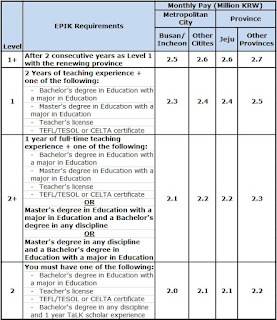This information is as it stands now (the landscape of teaching in Korea is changing) in 2015, specifically for Canadians and with some added information for couples in particular.I'll use bullet points for the most part, to keep it as simple as possible.
Our situation:
Base Salary
 Despite a Graduate Diploma in Education, I'm (Brian) starting at the 'bottom' of the pay scale (level 2) as jobs are so competitive that EPIK is not hiring what they consider to be a level 3 (only a bachelor's degree in any discipline). You need some sort of accredited ESL teaching certification (TEFL, TESOL etc). Because of where we are located (Chungnam Province) this puts us both at a base salary of 2.2KRW.
Despite a Graduate Diploma in Education, I'm (Brian) starting at the 'bottom' of the pay scale (level 2) as jobs are so competitive that EPIK is not hiring what they consider to be a level 3 (only a bachelor's degree in any discipline). You need some sort of accredited ESL teaching certification (TEFL, TESOL etc). Because of where we are located (Chungnam Province) this puts us both at a base salary of 2.2KRW.Extras
Add to this a rural bonus of 100,000KRW per month for not having the same conveniences as if we were in a big city. Our town is Buyeo, and has pretty much everything we need, but we do go to a neighboring city every 3 - 4 weeks to do a big shop at a major department store.
Finally, because we both teach at multiple school, we get another bonus. I (Brian) teach at 4 school, while Julia teaches at 3. Each additional school is 50,000KRW extra. This puts us at 2,450,000 and 2,400,000 respectively.
As of today, 2,450,000KRW = $2,700CAD.
We also each received a 300,000KRW settling allowance to help us get set-up in our apartment (buy new linens, toilet paper, kitchenware etc).
Bonus / Exit Allowance / Severance / Pension
After our year contract, should we renew, we get a bonus of 2,000,0000KRW. If we leave and go home, it's $1,300,000 (Exit Allowance, to cover flights). When we complete our final contract we get a severance bonus equal to one month's salary. We also get back our national pension contributions (9 % of our pay) which we contribute half and our school matches the other half. So upon completion of the final contract, that's a sweet little chunk of change to put in the bank when going home!
Expenses / Saving
When our salaries are added together, we're still not making quite what we were back home, but there is one major difference, we aren't paying rent / mortgage. Well, we do pay a mortgage back in Canada, but we have a renter that is more or less covering that.
Bills - Monthly
Rent = $0
Heat = 50,000KRW (average, we had two high months around 75,000KRW - 80,000KRW as it was still cold, but we rarely use the heat now other than for showers and dishes, so this most recent month was 35,000KRW)
Electricity = 10,000KRW (yeah, roughly $10)
Cell Phones = (58,500KRW - but we have pretty much unlimited everything, you can certainly go cheap here)
Home = $800CAD (accelerated mortgage payments, car payments, storage unit)
Other Expenses
Transportation - it's $1.25 for a one way trip on a bus. We can get pretty much anywhere in our town for less than 8,000KRW by taxi.
Eating in restaurants is CHEAP. A basic meal is about 5,000 - 7,000KRW for bibimbap or ssambap.
Groceries (especially produce) is much pricier than in Canada. Many things are close to double, which makes eating out even more attractive. We try to eat as much as possible at home, simply because we like to know exactly what we're eating, but you could get away with eating most meals out and not pay much more.
A (express bus) trip to Seoul (2 hour bus ride) is ~12,000KRW one way and Nonsan (department store) is ~2,500 one way.
All this said, we've been able to save ~$1500 - $2000CAD monthly, with little to no effort. We've taken weekend trips to Seoul, a 5 day trip to Jirisan and Busan, and have spent a good chunk of change to get set-up here.
Now that we're a few months in and expenses have dropped, if we can save $2,000 per month (which should easily be doable, even with travel) we'd save around $22,000 after the first year (with slower first couple of months). If we leave after one year (not likely), that swells to over $35,000 with severance, exit allowance and pension repayment.
So there you have it, our economics in a nutshell. If you're thinking about going down the ESL path and are doing your due diligence with research, you'll have most likely heard that in Korea 'it varies'. Every situation is different, and you need to be prepared for something completely different than what you envisioned. When we applied, we pictured ourselves teaching in a single elementary school in Busan, the second biggest city in South Korea. The reality? Teaching middle school in rural South Korea at a combined 7 schools. As it turns out, we absolutely love our situation, but that isn't the case for everyone. Many people struggle to deal with their placement and are unhappy for a year, if they last that long. We're lucky to have each other, which certainly makes things easier, but it's important to be ready for ANYTHING in Korea.

No comments:
Post a Comment